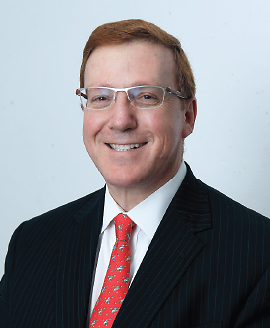To nearly every challenge facing APA, psychiatry, and American medicine, Saul Levin, M.D., M.P.A., brings a seasoned hand in his new role at APA. He succeeded James H. Scully Jr., M.D., as CEO and medical director on October 15.
With a background in public health focusing on populations and health disparities, administrative experience in federal and state government, and private-sector experience as the founder and CEO of a health care consulting company, Levin brings tested talent to the challenges of health care reform, integrated care, and membership association leadership. He also has many years of involvement with the AMA’s House of Delegates as a representative for APA and three years of experience as the AMA’s vice president for science, medicine, and public health.
“With the Affordable Care Act, we are shaping a new system of health care delivery, with an emphasis on population-based collaborative care,” Levin told Psychiatric News. “I hope that my cumulative experience in public health, service-system design, and linking mental health and substance use with primary care services will enable our members to navigate a new environment and ensure that psychiatry’s perspective is at the table.
“And I want to also ensure that APA thrives in the long term in a business environment,” he said. “It used to be that membership organizations like APA could survive on member dues alone, but today we need to develop a wider portfolio and diverse revenue sources.”
Levin was born and educated in South Africa. He received his medical degree from Witwatersrand University in Johannesburg and trained in psychiatry at the University of California, Davis. In 1984, he received his master’s of public administration from Harvard University’s Kennedy School of Government.
He comes to APA most recently from the District of Columbia Department of Health, where he was head of the department and senior deputy director of the District’s Addiction Prevention and Recovery Administration. In this role, Levin led efforts on behalf of District of Columbia residents to promote access to quality health care, including the provision of school-based nursing services (including mental health collaborative services) and implementation of an electronic health information exchange. Additionally, he served as chair of the D.C. Essential Health Benefits Package Subcommittee for the D.C. Health Benefit Exchange Authority and oversaw the merger of substance use and mental health services into a new, unified Department of Behavioral Health.
Levin was the founder and president of Access Consulting International, which provided technical assistance to grantees of the Substance Abuse and Mental Health Services Administration (SAMHSA), NIMH, and the Centers for Disease Control and Prevention and helped organizations obtain grants and contracts for programs serving disadvantaged populations—women and children, the elderly, LGBT individuals, people with mental illness and substance use disorders, people with HIV/AIDS, and homeless people. He has also served in several capacities at SAMHSA and its predecessor agency, the Alcohol, Drug Abuse, and Mental Health Administration, helping to create linkages between primary care, mental illness and substance abuse prevention, treatment, and research.
Along the way, Levin was the CEO and president of Medical Education for South African Blacks, a nonprofit organization that for 22 years helped provide over 11,000 scholarships to disadvantaged black students in his native country so that they could enter into the health and medical sciences in universities and technical colleges.
From 2009 to 2011, when Levin was vice president of science, medicine and public health at the AMA, he was charged with helping to improve the interface between clinical medicine and public health and engaging physicians in population and public-health strategies. He helped to coordinate the AMA’s activities in science policy and biotechnology, and he was instrumental in reinvigorating the AMA’s involvement in mental health (including substance abuse) issues with APA and subspecialty organizations.
Longtime friend and colleague Carolyn Robinowitz, M.D., a former president and senior deputy medical director of APA, said Levin will bring to the medical director’s office energy, creativity, and a keen political acumen—as well as a warm collegiality and a sharp sense of humor. She recalled especially that Levin has been invaluable to psychiatrists seeking to become more effective advocates in the AMA House of Delegates; he served as “campaign manager” to Robinowitz in her successful campaign for a seat on the AMA’s Council on Science and Public Health.
“I have known and worked with Saul since he was a resident,” she said. “Then as now, I was impressed with his intellect, energy, and effectiveness. A quick study, he is always prepared and expects the same from colleagues. He is a wonderful mentor—not only of trainees but of those of us more advanced in our careers.”
Seeing Value for the Dues Dollar
Levin had an “easing in” period prior to assuming the CEO and medical director’s chair, a period he says he used to acquaint himself with what he called an “amazing” staff at APA. And he praised Scully, his predecessor, saying that he leaves behind an APA that is much stronger—financially and in other ways—than it was when he assumed the office in 2003.
Goal number one, Levin said, will be to not only continue but enhance the Association’s services to members. “We want to ensure that members see value for their dues dollar,” Levin said. “We want our website to be as state-of-the-art as possible, and we want members to be able to get their questions and problems answered or solved as quickly as possible. Members need to know that all of the APA staff is there to serve them.”
Outside APA’s walls, health care reform and a changing health delivery system will be central to the new CEO and medical director. “Clearly, private and public payers are moving toward the use of quality measures and performance improvement,” Levin told Psychiatric News. “Psychiatry needs to position itself to develop quality measures that reflect our patients’ needs and will be acceptable to payers,” he said. “Parity is critical for our members and our patients, and we will continue to work through legislative, regulatory, and legal routes to ensure that parity is fully implemented.”
Additionally, Levin said that APA must provide resources and training to psychiatrists who will increasingly be working in teams and integrated systems of care. “Psychiatrists will be working in a number of critical roles as leaders of these systems and as team members with allied mental health practitioners and with other medical specialists,” he said. He added that APA is in the development stages of preparing training materials for current and future psychiatrists to secure the core competencies they will need in the emerging care models.
Repositioning for the Future
The emerging models of collaborative care will also mean a new focus on population health and the use by psychiatrists of “registries”—databanks charting the health status and progress of an entire caseload or population—to help primary care practices manage mental health and substance abuse disorders.
But Levin also emphasized that there will always be a place for private practice. “The future practice of psychiatry will be heterogeneous, and emerging systems will be inclusive of a variety of practice arrangements and locations and environments,” he said.
Another important goal of Levin’s is greater collaboration between APA and allied medical and mental health groups, and in this cause his long background with the AMA, and crucial personal ties to leaders of many medical specialty groups, will be vital. One of his first priorities was to create a new position titled chief of allied and external partnerships and hire Kristin Kroeger, previously director of government relations and clinical practice for the American Academy of Child and Adolescent Psychiatry, to fill it.
“I really do believe the AMA’s slogan that ‘Together We Are Stronger,’ ” Levin said. “If we work together, we can ensure that Congress and the administration as well as the public see that as clinicians we are there to provide quality patient care and also that we should be reimbursed for that care.”
Levin said that though the current landscape may seem tumultuous, he believes the future is bright for psychiatry and APA. “I look forward to working with our members and reaching out to those who are part of psychiatry to strengthen our practices and improve the lives of the patients we treat,” he said. “I believe the Affordable Care Act will ultimately help psychiatry become integrated back into the medical continuum of care in the way it should have been all along. The question on the table now is not whether behavioral health will be integrated, but how. In the end it will be a system that will serve our patients well.” ■

